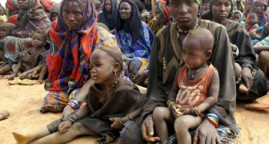Partnering with the private sector to innovate humanitarian response
Article published on the OCHA website on 09/26/2018
Collection and analysis of data have revolutionized nearly every aspect of modern business. Yet, these advancements have occurred at a time of increasing humanitarian need. While Governments maintain overall responsibility for responding to humanitarian emergencies, private sector actors can play a major role given their unique expertise, capacities, resources, and networks.
In fact, the private sector is using data to become more effective and efficient. To explore how humanitarian organizations can partner with the private sector to bring innovative insights and techniques to emergency response, the high-level event Partnering with the Private Sector: How Data Can Improve Humanitarian Response looked at how humanitarian and private sector organizations are effectively working together to respond to humanitarian needs and emergencies.
“We must recognise that the private sector is in many respects more advanced and experienced, and definitely faster when it comes to these issues”, said ASG Ursula Mueller in her remarks. “We need the support of the private sector to accelerate our progress and take advantage of new sources of data. This is especially true when we consider the potential risks that arise with increased collection and sharing of data. (…) As the United Nations Secretary-General António Guterres said earlier this month, “the private sector is driving much of the progress” of new technologies, and it is also incumbent upon the United Nations to work in partnership, be humble, and continue to learn.”
“There is a real need for both the private sector and humanitarians to speak the same language and, perhaps, to refocus our energies on predictive work for a better prevention and mitigation of disasters, instead of getting caught in a continuous cycle of humanitarian assistance,” said Sanda Ojiambo, Head of Corporate Responsibility, Safaricom.
The event comes two years after the World Humanitarian Summit, where both the Connecting Business initiative (CBi) and the Centre for Humanitarian Data were launched, and focused on how the sharing and use of data can help build local capacity to prevent, prepare for, and respond to, and recover from crises, and how businesses are partnering with the UN, governments, and civil society to improve humanitarian response. The event was an opportunity to discuss good practices – from mobile money in Kenya, which is changing millions of lives offering a free platform serving refugees in camps to help them reconnect with relatives and friends, to the collaboration among Asia Pacific Alliance for Disaster Management, Transparenta.MX, Microsoft, the American Red Cross and Amazon in support of emergency response and recovery efforts in the world’s most disaster-prone region.
Related Articles
5 natural disasters that beg for climate action
Climate hazards are natural events in weather cycles. We are currently witnessing a scale of destruction and devastation that is new and terrifying.
Sahel’s plight worsens amid fighting, says UN aid chief
03/18/2015. Conflict in Africa’s Sahel region is the biggest threat to saving lives in one of the poorest places on earth, according to the UN aid chief in charge there.
Modern slavery : myths & facts
Modern slavery is all around us, but most people don’t even realize it. Learn the truth about these common myths and then sign up to help end modern slavery for good.





